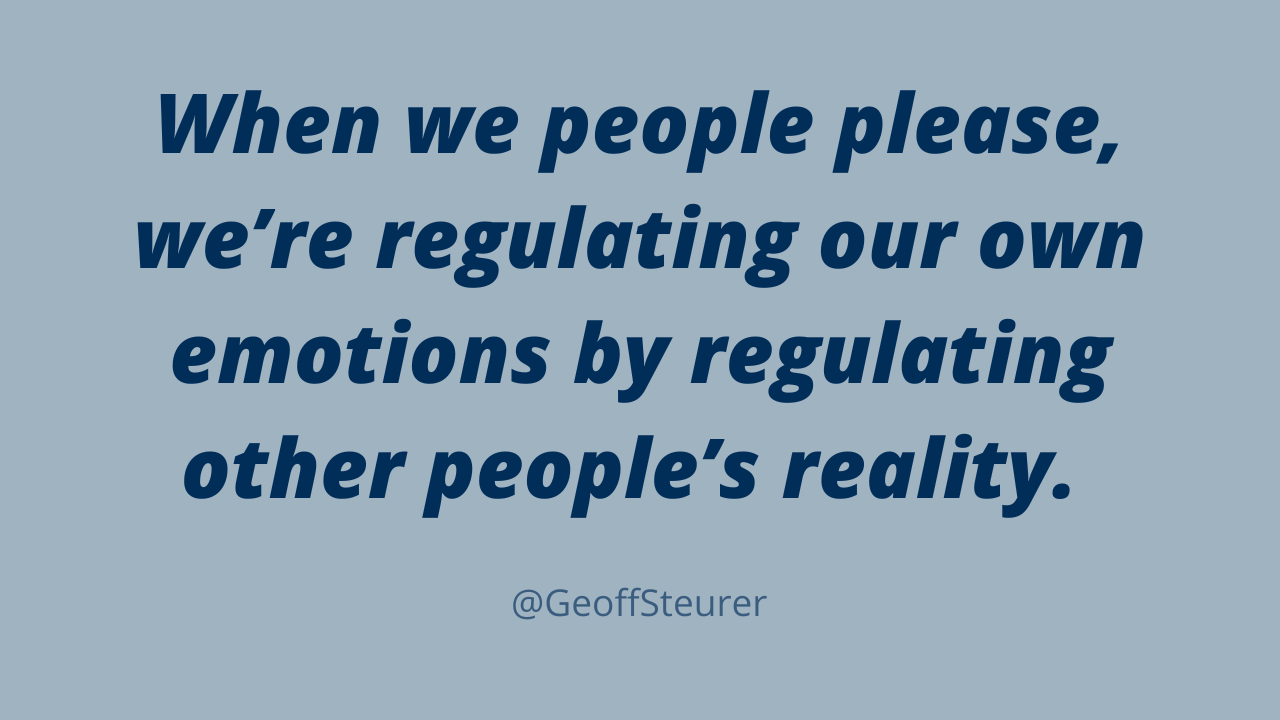
Q&A with Geoff: How do I stop trying to please everyone?
Question
How do I stop trying to please everyone and respond how I think they want me to respond? How do I be honest with my feelings? I feel like I am just telling myself what I would like to hear as well.
Answer
The fact that you’re asking this question means that you’ve already become more honest with yourself. Something about the way you’re showing up in relationships doesn’t feel right and you want something different. Paying attention to that internal incongruence is going to be a foundational skill as you develop better relationship reflexes.
Let’s talk about how you can become more emotionally honest with yourself and others.
When we people please, we’re regulating our own emotions by regulating other people’s reality. If we don’t recognize the fact that we’re emotionally dysregulated, we’ll keep trying to manage everyone around us instead of dealing directly with our own emotions. For example, if you’re afraid of being criticized by others, you’ll agree to do things you don’t want to do.
Instead of confronting your fear of being criticized, you’ll seek immediate relief through manipulation. However, the punishing part of people pleasing soon follows as you must now live with the false promises you’ve made.
People pleasing is common because we’re wired to stay close to others for our own stability. Social baseline theory says that, as humans, we have an easier time regulating our own emotions when we’re connected to the group instead of trying to self-regulate in isolation.
The risk of being separated from the group through judgement, criticism, rejection or abandonment is something we’re constantly monitoring.
Consequently, controlling other people’s reactions to us is an instinctive way for us to guarantee that we’ll retain our connection to the group and, therefore, the ability to regulate our emotions. It takes tremendous courage to show up as ourselves and trust that we’ll be okay. Let’s talk about how you can do this.
As I pointed out earlier, you already have a sense that the way you’re showing up isn’t healthy for you. It takes humility and courage to act on this awareness and make the necessary adjustments. For example, if you commit to doing something you don’t want to do, you’ll feel the uneasiness of trading immediate relief for your integrity.
Even if you overcommitted, you could change your commitment, renegotiate a different arrangement, or, if nothing else can change this time, learn your lesson for the future. It takes practice paying attention to this internal compass and then acting on it.
You’ll have some anxiety and fear at first, but you’ll start to see that the fear of being rejected and isolated simply doesn’t come true in the way you imagined it.
Give yourself the time and permission to circle back around and revisit anything that doesn’t feel right. There’s nothing wrong with saying something like, “I overcommitted, and I need to make an adjustment”, or, “I agreed to something that, upon further reflection, isn’t going to work for me.” Yes, you’ll have some anxiety and fear as you practice this level of integrity.
However, it will become more reflexive and soon you’ll see that people can handle disappointment when you stop people pleasing.
If you still can’t seem to break out of these patterns, it’s worth exploring other reasons for the people pleasing. You might have been raised in a family system where you learned that other people’s needs are more important than yours. You may have experienced interpersonal trauma and have difficulty setting healthy limits for yourself.
These areas can be explored and addressed in the care of a mental health professional.



